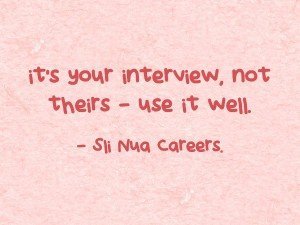By Liam Horan, Career Coach & Managing Director, Sli Nua Careers

Q: I am going for interview in the company where I currently work – I’m bothered by the fact that I will know all three members of the interview panel very well. I’d classify them as friends, really. I fear I will be very self-conscious on the day – how can I avoid this? (DR, email).
MARK MCDONALD DUBLIN NORTH; DR, this is a very common issue for those preparing for internal interviews. It can certainly be awkward to sit in front of an interview panel and try to sell yourself to people you know professionally or personally. The bottom line here is that it’s your interview, not theirs, and the onus lies on you to perform at your maximum in order to achieve your goal.
 They have a job to do i.e. select the best person for the role. Your objective is to demonstrate that you are the best candidate available to match their needs. Your focus should be centered on using the interview to prove your suitability. You’re selling yourself, your skills, your experience and the value you can add in the new role. This is where your concentration needs to lie.
They have a job to do i.e. select the best person for the role. Your objective is to demonstrate that you are the best candidate available to match their needs. Your focus should be centered on using the interview to prove your suitability. You’re selling yourself, your skills, your experience and the value you can add in the new role. This is where your concentration needs to lie.
You can’t change the fact that you know these people. It may also be awkward for them. My advice is to put that to the back of your mind and focus on the main issues surrounding the interview. Prepare for the interview by working on your sales pitch. Have examples prepared that show your ability to match the requirements. Position yourself as the candidate who will eliminate the opposition.
The context of the interview shouldn’t in any way be negatively affected by your relationship with the interview panel. Your preparation should reflect this. Prepare and practice as if you were going to be interviewed by complete strangers.
We can’t control the make-up of interview panels. Therefore it’s best not to dwell too much on them. Focus on what we can control i.e. our performance on the day. Keep it professional, sell yourself to your maximum, know the job spec inside out, prove your existing value to the organisation and demonstrate what you will add in the future.
They have a job to do on the day as do you. The best outcome for both parties is to park any personal relationships and keep the dialogue professional.
MARY O’BRIEN KILLEEN CLAREMORRIS; DR, I suggest that you approach the interview as if no member of the panel knows anything whatsoever about you. Sometimes we assume that co-workers know everything we are doing, and have already formed opinions of us, but, remember, this is your opportunity to shine and talk up your achievements, skills and attributes.
Be clinical in your approach and that will take away the self-conscious aspect.
FINTAN DUNNE SLIGO; DR, regardless of your relationships with the members of the panel, it is important that you enter the process in interview mode; this will allow you to focus on the questions rather than the friendships.
If you don’t do this, and discover on the day that the panel is in its interview mode, you’ll be starting on the back foot and spiralling down rather than up. On the day there may be others outside of your company seeking the same appointment and your friends on the board will look just as favourably on them as you.
If you would like to make a booking with any of our career coaches, see HERE for CV Preparation and Interview Training.